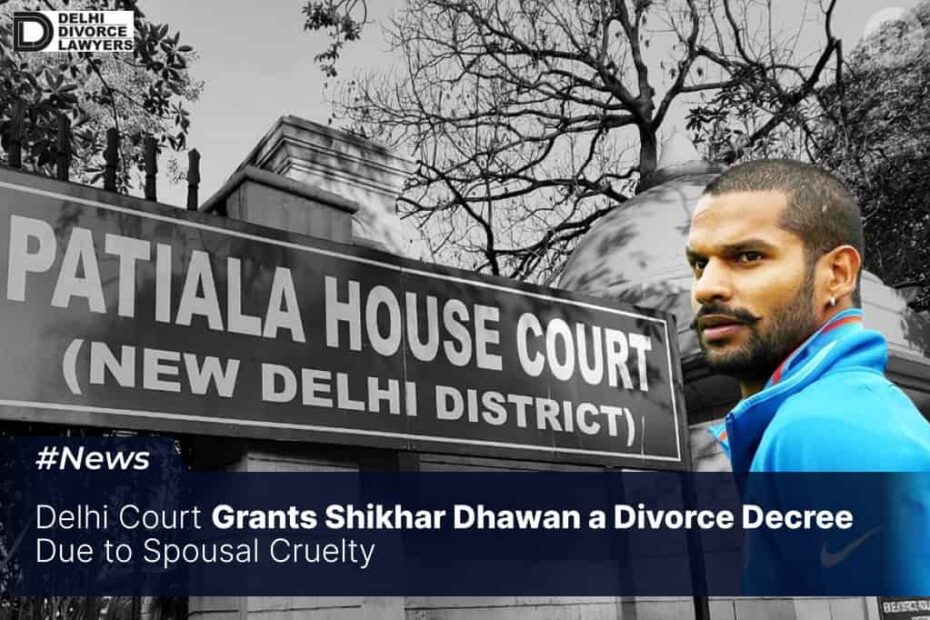Family Court Judge Harish Kumar accepted majority of the allegations made by Dhawan against his estranged wife and held that she subjected him to mental agony and cruelty.
In a recent judicial pronouncement rendered on Wednesday, a family court situated in Delhi successfully adjudicated the contentious matter involving Shikhar Dhawan and Aesha Mukerji. The outcome of the proceedings culminated in the issuance of a divorce decree in favor of cricketer Shikhar Dhawan, predicated upon allegations of mental cruelty alleged against his spouse.
Presiding over the case, Judge Harish Kumar delivered a verdict in Dhawan\’s favor on all grounds as articulated within his divorce petition. The judgment was rendered in light of Aesha Mukerji\’s election not to contest these allegations or provide a substantive defense thereto.
Judge Kumar took cognizance of the fact that Aesha\’s actions, which precipitated Dhawan\’s prolonged separation from their sole offspring, had inflicted significant mental anguish upon him.
Significantly, while the court refrained from issuing a final determination regarding the permanent custodial arrangements for the couple\’s child, it did extend visitation rights to Dhawan. These visitation rights encompass the privilege to spend a reasonable duration of time with the child in both the jurisdictions of India and Australia, inclusive of the provision for video communication.
Furthermore, the court mandated that Aesha undertake the requisite measures to ensure the child\’s presence in India for visitation purposes. This directive encompasses the possibility of overnight stays with Dhawan and his extended familial connections during at least fifty percent of the school vacation period within the academic calendar.
\”Since petitioner is a reputed International Cricketer and has been pride of the nation, subject to petitioner approaching the Union Government of India, it is requested to take up the issue of visitation/custody of the minor son with its counterpart in Australia to help him have regular visitation or chatting with his own son or his permanent custody,\” the Court ordered.
In alignment with Mr. Dhawan\’s assertions, his spouse initially conveyed her intent to establish her primary residence in India alongside him. Nonetheless, she encountered an impediment in fulfilling this commitment, stemming from a prior obligation to her former spouse, with whom she co-parents two daughters. This prior commitment required her to maintain her domicile in Australia, where she presently resides with her two daughters and a child she shares with Mr. Dhawan.
\”He (Dhawan) for no fault of his own had been through immense agony and anguish of living separately from his own son for years. Even though the wife denied the allegation, submitting that though she genuinely wanted to live in India with him, however due to her commitment towards her daughters from her previous marriage requiring her to stay in Australia, she could not come to live in India and that he was well aware of her commitment, yet she did not choose to contest the claim,\” the judge noted.
Unchallenged testimony of Dhawan has to be believed, the judge said, while adding,
\”Hence, it stands proved that the wife backtracked from her assurance of setting up matrimonial home in India after marriage and thus made him suffer a long distance marriage and suffer immense agony and anguish of living separately from his own son for years.\”
The Court conducted a thorough examination of Mr. Dhawan\’s assertion that his spouse exerted pressure upon him to transfer 99 percent ownership of three properties situated in Australia, which he had acquired using his personal financial resources. Additionally, the Court took cognizance of her insistence on co-ownership of two additional properties.
Subsequently, the presiding judge rendered a determination that Aesha\’s failure to contest this allegation implied her acquiescence to Mr. Dhawan\’s narrative.
\”Thus, in the absence of any of probable defense, Dhawan\’s allegation that she compelled him to make her owner to some extent in all three properties or that she pocketed sale proceeds thereof to the extent pleaded and testified to by him has got to be believed as true,\” it was held.
In reference to the allegation that Aesha intentionally disseminated defamatory messages to various individuals affiliated with the country\’s cricket board, IPL team owners, and fellow cricketers, her defense centered on the contention that she had exclusively directed these messages towards three specific recipients. She asserted that her primary objective was to secure the timely disbursement of her monthly maintenance payments, citing Dhawan\’s recurrent delays in fulfilling this financial obligation.
However, the Court declined to endorse her defense, ultimately determining that she had indeed transmitted injurious communications to multiple recipients, presumably with the intention of exerting pressure, besmirching Dhawan\’s reputation, and subjecting him to public humiliation.
Furthermore, the Court affirmed the accusation that Aesha engaged in a dispute with Dhawan concerning his \”allocation of time\” in providing support to his ailing father during the period when he contracted COVID-19.
\”Petitioner further alleged that in or around January 2020, the Aesha and the minor son came to India to spend a prolonged period of time, but her daughters stayed back in Australia but still she compelled him to send her daughters AU $15,500 per month (inclusive of mortgage payments) on the pretext that they were struggling to survive,\” the Court noted.
In addition to that money, Dhawan had to pay extra for school fees. So, he had to increase the monthly payments to AU $16,500 first, and then to AU $17,500 per month.

